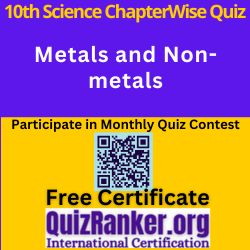10th Science Metals and Non-metals MCQ Test: Strengthen your understanding with free online multiple-choice questions for CBSE Class 10 Science Chapter 3. Master the properties, uses, and reactions of metals and non-metals. Ideal for CBSE exam and competitive test preparation.
Science Metals and Non-metals MCQ
Chapters of 10th Science for MCQ Test
You can not only check your knowledge about for “10th Science Metals and Non-metals MCQ Test Chapter 3” but also all remaining chapters multiple choice questions.
Chapter 1 Chemical Reactions and Equations MCQ Test
Chapter 2 Acids, Bases and Salts MCQ Test
Chapter 3 Metals and Non-metals MCQ Test
Chapter 4 Carbon and its Compounds MCQ Test
Chapter 5 Life Processes MCQ Test
Chapter 6 Control and Coordination MCQ Test
Chapter 7 How do Organisms Reproduce? MCQ Test
Chapter 8 Heredity MCQ Test
Chapter 9 Light – Reflection and Refraction MCQ Test
Chapter 10 The Human Eye and the Colourful World MCQ Test
Chapter 11 Electricity MCQ Test
Chapter 12 Magnetic Effects of Electric Current MCQ Test
Chapter 13 Our Environment MCQ Test
Also Attempt Free 10th class Math chapter wise MCQ Quiz [For Exam 2025]
Must Attempt Monthly Quiz Contest
- Class 9th Science quiz contest monthly
- Class 9th Math quiz contest monthly
- Class 10th Science quiz contest monthly
- Class 10th Math quiz contest monthly
You can also participate in yearly national quiz contest Dec 2024
Important Link
- NCERT Books PDF
- Our Youtube Channel(Subscribe for view Few Quiz Question Answers)
About Science Metals and Non-metals MCQ
Chapter 3 of the CBSE Class 10 Science curriculum, titled “Metals and Non-metals,” explores the diverse and essential elements that constitute the world around us. This chapter is crucial for students aiming to excel in chemistry and other competitive exams. The free MCQ quiz provided in this chapter will help students reinforce their knowledge and prepare effectively for their CBSE examinations.
Key Concepts Covered:
- Properties of Metals:
- Metals are generally hard, lustrous, malleable, ductile, and good conductors of heat and electricity.
- Common examples include iron (Fe), copper (Cu), and aluminum (Al).
- Metals tend to have high melting and boiling points.
- Properties of Non-metals:
- Non-metals are usually brittle, non-lustrous, and poor conductors of heat and electricity.
- Common examples include sulfur (S), carbon (C), and oxygen (O₂).
- Non-metals can exist in solid, liquid, or gaseous states at room temperature.
- Chemical Reactions of Metals:
- Metals react with oxygen to form metal oxides. Example: 4Fe + 3O₂ → 2Fe₂O₃.
- Metals react with water to form metal hydroxides and hydrogen gas. Example: 2Na + 2H₂O → 2NaOH + H₂.
- Metals react with acids to form salts and release hydrogen gas. Example: Zn + 2HCl → ZnCl₂ + H₂.
- Chemical Reactions of Non-metals:
- Non-metals react with oxygen to form non-metal oxides. Example: C + O₂ → CO₂.
- Non-metals typically do not react with water or dilute acids, unlike metals.
- Reactivity Series:
- The reactivity series ranks metals from most reactive to least reactive.
- Highly reactive metals, like potassium and sodium, react vigorously with water and acids.
- Less reactive metals, like gold and platinum, do not react easily with water or acids.
- Occurrence and Extraction of Metals:
- Metals are found in the earth’s crust in the form of ores.
- The extraction process involves steps such as concentration, reduction, and refining.
- Common extraction methods include electrolysis and smelting.
- Alloys and Their Importance:
- Alloys are mixtures of two or more metals, or a metal and a non-metal.
- They are designed to have improved properties compared to pure metals.
- Examples include brass (copper and zinc) and steel (iron and carbon).
- Uses of Metals and Non-metals:
- Metals are used in construction, manufacturing, electrical wiring, and many other industries.
- Non-metals are essential in pharmaceuticals, fertilizers, water purification, and other fields.
Quiz Structure:
The MCQ quiz for this chapter includes a series of questions designed to test students’ understanding of the properties, uses, and reactions of metals and non-metals. These questions cover definitions, examples, and applications, ensuring comprehensive coverage of the chapter. The interactive format allows students to practice and assess their knowledge effectively.
Conclusion:
Practicing with the 10th Science Metals and Non-metals MCQ Test is an excellent way for CBSE students to prepare for their exams. This chapter provides a thorough understanding of the fundamental concepts related to metals and non-metals. The MCQ quiz helps reinforce these concepts, ensuring students are well-prepared for their academic assessments and competitive exams.
Total Views: 28
